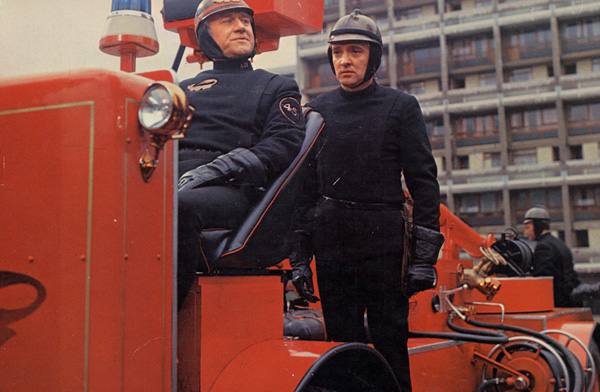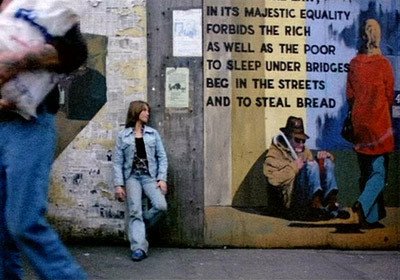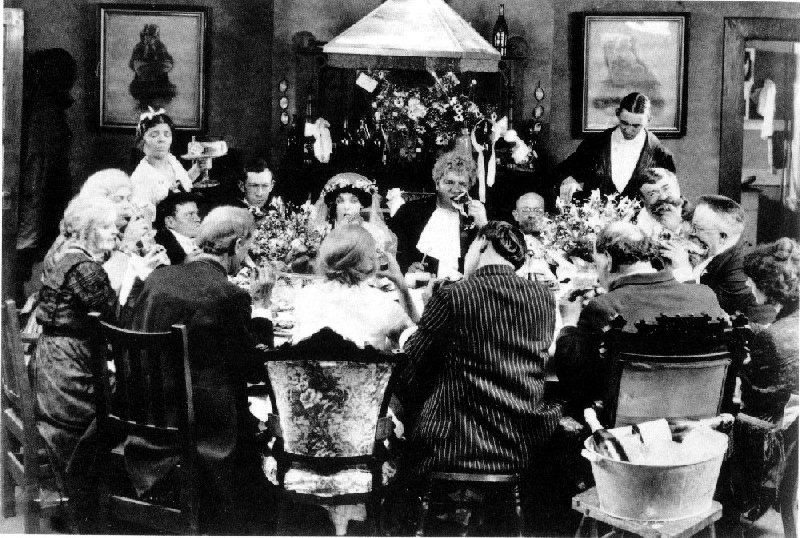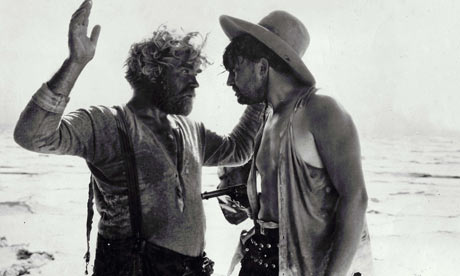
Yesterday, while reseeing François Truffaut’s Fahrenheit 451 for the first time in years at the Gene Siskel Film Center, just before doing a Skype interview with Ray Bradbury in California along with Bradbury’s biographer, Sam Weller, I was struck for the first time how different Truffaut’s and Bradbury’s historical groundings were. Bradbury’s novel, first published in the early 50s, clearly reflected the Cold War, whereas Truffaut’s English-language film (his only one) of 1966, two years before his secret discovery via detectives that his father had been a Jewish dentist, seems largely informed by his childhood experience of the German occupation of France, which he would only depict directly 14 years later, in The Last Metro.
The most surprising aspect of this for me is that I never thought of it earlier — but it becomes especially clear during the scene in which Montag (Oskar Werner) and Clarisse (Julie Christie) in a cafe secretly spy through a window an informer pausing before mailing his malicious report on a neighbor to the police/fire department (which in the world of Fahrenheit 451 is the same thing), meanwhile making comments on his behavior (some of which are reproduced below in the subtitles). It also seems evident in the number of old, early-40s books that one sees being burned in the many book-burning sequences, as well as in the dingy scenes set in old-fashioned basements, attics, etc. Read more

This obviously wouldn’t be an appropriate time to revive my negative review of Hopper’s Colors in the Chicago Reader 22 years ago, which can easily be accessed by anyone who might be interested. But I’d like to reproduce a couple of short paragraphs from it about my favorite Hopper film, which I continue to cherish:

To make sure my memory wasn’t playing tricks on me, I recently took another look at Hopper’s previous film, Out of the Blue (1980). Here was proof, if any is needed, that a celebrated burnt-out case came back to establish himself as the legitimate American heir to the cinema of Nicholas Ray — a cinema of tortured lyricism and passionate rebellion that reached its fullest flower in the 50s, as if to match the action painting that was roughly contemporary with it. Hopper managed to remake Ray’s Rebel Without a Cause (the film in which Hopper made his acting debut) in terms of a working-class punk (Linda Manz), an androgynous heroine whose grim fate suggested an Americanized version of Robert Bresson’s Mouchette. Casting himself, moreover, as her dissolute father, Hopper gave himself a disturbing part that seemed to update his role as Billy in Easy Rider. Read more
From the Chicago Reader, November 26, 1999. —J.R.

There’s surely no more famous lost film than Erich von Stroheim’s Greed, a silent film made in 1923 and ’24 and released by MGM in mutilated form in late 1924. If you believe the hype of Turner Classic Movies, what’s been lost has now been found —- even though the studio burned the footage it cut almost 75 years ago, in order, according to Stroheim, to extract the few cents’ worth of silver contained in the nitrate.

TCM’s ad copy states, “In 1924, Erich von Stroheim created a cinematic masterpiece that few would see — until now.” This is a lie, but one characteristic of an era that wants to believe that capitalism always has a happy ending, no matter how venal or stupid or shortsighted the capitalists happen to be. What TCM really means is that at 7 and 11:30 PM on Sunday, December 5, it will present a 239-minute version of Greed, which is 99 minutes longer than the 1924 release. The 99 minutes aren’t filled with rediscovered footage: instead the original release version has been combined with hundreds of rephotographed stills, sometimes with added pans and zooms, sometimes cropped, often with opening and closing irises. Read more





